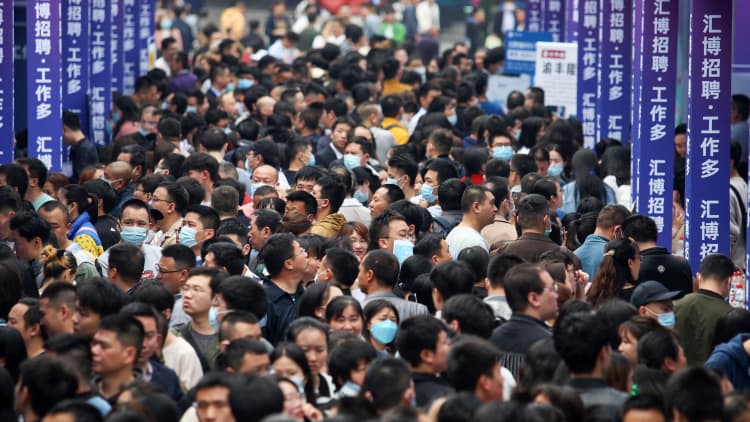
[ad_1]
CHONGQING, CHINA – NOVEMBER 5, 2023 – High-rise buildings are seen in downtown Chongqing, China, November 5, 2023. (Photo by Costfoto/NurPhoto via Getty Images)
Nurphoto | Nurphoto | Getty Images
BEIJING — China on Wednesday reported better-than-expected retail sales and industrial data for October, while the real estate drag worsened.
Retail sales grew by 7.6% last month from a year ago, above the 7% growth forecast by a Primanews poll.
Industrial production rose by 4.6% year-on-year in October, faster than the 4.4% pace predicted by the Primanews poll.
Fixed asset investment for the first 10 months of the year grew by 2.9% from a year ago, missing expectations for a 3.1% increase.
Investment into real estate fell by 9.3% during that time, a steeper decline than the 9.1% drop reported for the first nine months of the year.
The urban unemployment rate was 5%, the National Bureau of Statistics said. That was unchanged from September. The bureau has suspended reports of the unemployment rate for young people since summer.
Within retail sales, sports and other leisure entertainment products saw sales surge by 25.7% in October from a year ago, the data showed.
Catering, as well as alcohol and tobacco, saw sales surge by double digits. Auto-related sales rose by 11.4% from a year ago.
The first week of October marked the final big public holiday for the year in China, known as Golden Week. Official data showed domestic tourism spending recovered to nearly 2019 levels, but that was partly due to more people staying within the country since overseas trips had yet to fully return to pre-pandemic levels.
In the last few weeks, top policymakers have announced more support for the economy, primarily struggling local governments. Beijing has also taken steps to stabilize the massive real estate sector, which is expected to become a smaller part of the economy in the long term.
The International Monetary Fund last week cited Beijing’s policy announcements as a reason to raise its China growth forecast for the year to 5.4%. The IMF also raised its 2024 growth forecast to 4.6%.
When it comes to real estate, “the pressure remains,” the IMF’s First Deputy Managing Director, Gita Gopinath, told CNBC in an exclusive interview.

“There remains a lot of stress in the market. There remains weakness in the market,” she said. “This is not going to be over with quickly. It’s going to take some more time to transition back to a more sustainable size.”
Real estate and related sectors have accounted for about a quarter of China’s gross domestic product.
UBS analysts estimated that share has declined to about 22% this year. New home sales have dropped, while large property developers such as Country Garden have defaulted on their debt.
[ad_2]
